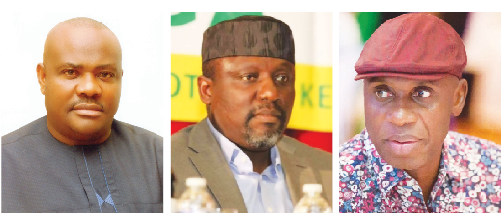The country’s local government administration needs to be strengthened for effective governance at the grassroots, Assistant Editor (South South), JOE EZUMA, writes.
The failure of the Association of Local Governments of Nigeria (ALGON) to actualise full autonomy for the local government system in the country during the 2014 Constitution Conference and the unfolding antics of the Peoples Democratic Party (PDP)-led administration in Rivers State have, again, brought to the fore the debate over the existence and status of the third tier of government.
The local government system, going by the 1976 reforms, is structured towards the management of the affairs of a given locality by its people. It can also be defined as a political authority for the purpose of dispersing or decentralising political power.
In fact, the Nigerian guidelines for local government reforms of 1976 defined the system as “government at the local level exercised through representative councils established by law to exercise specific functions within defined areas”.
All the attributes of the system are geared towards bringing governance nearer to the people for bringing faster development to the grassroots and ensuring participation of the local people in decision-making on matters that affect them.
The arrangement, which saw the creation of the 774 local governments in the country, was greeted with excitement. The same enthusiasm resonates each time election is conducted in the councils, essentially because of the expected sense of belonging it offers the people and hope of achieving development which it holds out for them.
But on account of recent developments in recent times, it has remained a hotly-debated topic as to whether the local government system is still desirable or whether it had achieved its aim. This is because of problems that have dogged local governments in areas of operation, conduct of the operators, intrusive politics as well as incidence of corruption that have characterised the tier.
Against this background, there have been calls for the scrapping of the system. There are also those who believe that the arrangement should be retained, laced with some reforms.
Imo State governor, Rochas Okorocha, and Mayor of Port Harcourt, Chimbiko Akarolo, are among those who argue for closer examination on role of the local government and the state in rendering service to the electorate.
The governor had on occasions lamented that the incidence of corruption at the local government level was alarming and needed to be addressed for the people at the tier to benefit from governance.
He had, in apparent intention to test the workability of the system, announced that he would give every local government N200 million or share N2.4 billion among the councils in the state and watch why they could not perform. He also unfolded an arrangement under which the state and local government would work in synergy whereby the state government would not only act as a check to the local government but also drive it to be proactive. Even with the Okorocha model, the councils are yet to get their bearings, not only in Imo but virtually in all states of the federation.
Perhaps, the vulnerability of the council system is being manifested in the ongoing impasse between the newly-elected council chairmen in Rivers under the umbrella of ALGON and the state government. In what had appeared a demonstration of the extent of disdain to which the local government has become subject of intrigues in the state, the state government under former Governor Chibuike Amaechi, which, for most times, operated caretaker system, hurriedly organised local government election seven days to the end of that administration.
Of course, the PDP administration of Nyesom Wike did not find it funny, just as many observers of developments in the state raised eyebrow.
The administration, in what observers saw as first steps in nullifying the election, dissolved the Rivers State Independent Electoral Commission (RSIEC) and followed up with a directive to banks and other financial institutions not to deal with the councils. But sensing the action as “an agenda to sack duly-elected and constituted local government councils without recourse to the due process of law”, ALGON, the umbrella body, is not taking the matter lightly and has gone to court to stop the move.
While ALGON battles with the issue, Akarolo argues that there is nothing like local government in Nigeria in real terms, stressing that that tier of government has been substantially subsumed into the state government structure. This notwithstanding, he maintains that local government is still relevant for grassroots development and participation of the greater number in governance.
“If you remove the local government, the people are finished,” he warned, adding that what is needed is to reform the system. The Port Harcourt mayor also stresses the need for separation of powers among the three tiers of government, arguing that by the existing arrangement, apportioning of roles and responsibilities are still hazy to the public.
He called for clear delineation of roles between state and local government councils to avoid clashes of interest and roles that are capable of slowing down development endeavours. For now, he said, there is no clear-cut local government administration, especially as the states have virtually usurped the responsibilities of the tier.
Akarolo, however, lauded Amaechi, who, he said, gave the local governments in Rivers latitude to operate by allowing them access to their allocations.
“One of the wonderful things about how the governor handled the affairs of the local governments was to remove the burden of paying teachers’ salaries from them,” he said.
He remarked that the ministries are policy-makers and should not be involved in the management and control of structures and roles that should be within the purview of the local governments as being witnessed in some states. He noted, for instance, that even if the Ministry of Environment, by virtue of its duties, builds public conveniences, it should hand over the facilities for control and administration to the city council, and not be involved in collection of monies from members of the public that use the conveniences as currently obtained in the state.
Lamenting the absence of records and accountability in the councils, the Mayor said: “There is the need to make the people feel the impact of the third tier government through service delivery, but we must have proper records of revenue channels to be able to deliver.”
Former Abia State local government official, Chima Okoro, confirmed the high incidence of laxity in the councils.
“There is high level of corruption in the local government administration,” he said.
He observed that while most of the local government chairmen in the country hardly stay on their duty posts, their largely unruly staff apply violence in their revenue drive, with the sole aim of lining their pockets.
Okoro alleged that the trend in some councils is for the chairmen to collect monthly allocations, come to the councils and deploy fund for salaries and few essential works and share the rest among the councillors and key officers, and everybody disappears till the next allocation.
He condemned the practice whereby thugs who were used for odd jobs during election get recruited as council staff, saying: “This is why their operations are often violent and extortionist. There should be parameter for engaging staff, whether in the ministry or the local government council, with consideration for discipline, character good family background and conduct among others.”













